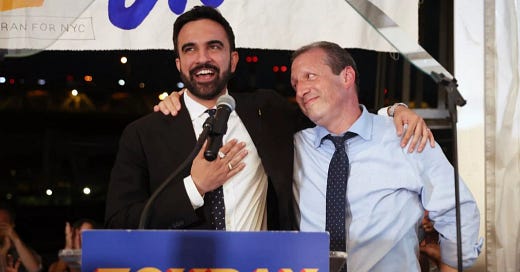There have been a lot of hot takes today on Zohran Mamdani's win in New York City mayoral primary last night all the way from "NYC isn't safe for Jews!" (as Zohran stands next to New York's highest ranking Jewish official, who endorsed him, in the photo above) all the way to "This changes everything in American politics!" Yes, this was a local election, but for a city with a $100 billion budget and a trillion dollar economy that has a outsized impact on America. The campaign may also have ripple effects on the Democratic brand and politics in other parts of the country, so it's worth thinking about why it worked.
For anyone who thinks the brand of the Democratic Party is terrible right now (at least 2/3 of Americans), when considering the significance of this election, I humbly suggest resisting the urge to just rank Mamdani from 1-100 on the scale of left to right to see if he is "too far" for you. Most swing voters don't actually do this anyway. So-called “moderate" voters have stunningly mixed views on a lot of issues in practice, and mainly end up voting with their gut/heart on election day.
I also don't suggest just reading someone else's hot take. Go watch a video of him and see for yourself what you think. Check out his interview on the Breakfast Club (where Biden bombed in 2020) or his debate performance against Cuomo, or his very hostile interview on Good Day New York. See how his full answers strike you, on a gut level.
Personally, my scale for candidates is more like 1-100 on thoughtfulness, regardless of where they are coded “left to right,” with Trump at about a 2 on thoughtfulness and Obama maybe in the mid 90's. A candidate doesn't have to agree with me on every single issue, or even agree with themself of 5 years ago on everything, to be a good leader. Zohran likes to quote Ed Koch, "If you agree with me on 9/12 things, then vote for me. If you agree with me on 12/12 things then go see a psychiatrist!" That's the way politics should be in a healthy representative democracy.
In my opinion, Mamdani's answers scored very high on the thoughtfulness scale. On some of his more controversial policies, like free public buses, he isn't just pulling things out of thin air. He cites other cities where this has been tried, and a successful trial run in NYC. He has the budget numbers on it. He also isn't ideologically wedded to any one policy choice, and is willing to course correct if they don't get the results he hoped for, eg public grocery stores in areas which are currently food deserts. He wants to pilot one of these in each borough, based on models in Georgia, Kansas, and Wisconsin, and see how they work out. In both of those examples, he is discussing a problem that currently exists for residents, and a new approach to addressing it.
Just as important, however, is the way that he talks about policy. Democrats are often chided for being too wonky (yours truly included), but Zohran's answers feel very digestible for the average non-politico. He gives stories about normal people struggling with these problems daily. Crucially, he has a very clear message: everyone in deserves the dignity of being able to afford a good quality of life. Affordable housing, affordable childcare, affordable transportation, affordable medicine, affordable healthy food etc. These are all basic necessities for every person, and they cut across the culture war lines.
From a national perspective, it isn't a coincidence that "affordability" was the #1 issue people brought up to me in Arizona, Nevada, Michigan, and Pennsylvania in November. Unfortunately, almost no one knew what Kamala Harris' message on affordability was. That is not true in this case. Despite well-funded efforts to make the election about other things, Zohran's campaign kept it completely focused on quality of life and affordability for everyone. As a candidate, he boiled that down so clearly, that it was very easy for people to understand and share with their friends, despite being outspent 10 to 1. (He was polling at around 1% just 6 months ago, but his campaign spread rapidly and wildly through word of mouth, social media, and relational organizing.)
Whatever you think about this outcome, there is no doubt it was a “political earthquake” and the Democratic Party could learn some lessons from it.
Discussion about this post
No posts




